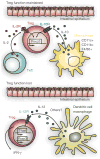Regulatory T-cell stability and plasticity in mucosal and systemic immune systems
- PMID: 20505662
- PMCID: PMC2924438
- DOI: 10.1038/mi.2010.27
Regulatory T-cell stability and plasticity in mucosal and systemic immune systems
Abstract
Regulatory T cells (Treg) express the forkhead box p3 (Foxp3) transcription factor and suppress pathological immune responses against self and foreign antigens, including commensal microorganisms. Foxp3 has been proposed as a master key regulator for Treg, required for their differentiation, maintenance, and suppressive functions. Two types of Treg have been defined. Natural Treg (nTreg) are usually considered to be a separate sublineage arising during thymus differentiation. Induced Treg (iTreg) originate upon T cell receptor (TCR) stimulation in the presence of tumor growth factor beta. Although under homeostatic conditions most Treg in the periphery are nTreg, special immune challenges in the intestine promote more frequently the generation of iTreg. Furthermore, recent observations have challenged the notion that Treg are a stable sublineage, and they suggest that, particularly under lymphopenic and/or inflammatory conditions, Treg may lose Foxp3 and/or acquire diverse effector functions, especially in the intestine, which may contribute to uncontrolled inflammation.
Conflict of interest statement
The authors declared no conflict of interest.
Figures

References
-
- Bennett CL, et al. The immune dysregulation, polyendocrinopathy, enteropathy, X-linked syndrome (IPEX) is caused by mutations of FOXP3. Nat Genet. 2001;27:20–21. - PubMed
-
- Brunkow ME, et al. Disruption of a new forkhead/winged-helix protein, scurfin, results in the fatal lymphoproliferative disorder of the scurfy mouse. Nat Genet. 2001;27:68–73. - PubMed
-
- Wildin RS, et al. X-linked neonatal diabetes mellitus, enteropathy and endocrinopathy syndrome is the human equivalent of mouse scurfy. Nat Genet. 2001;27:18–20. - PubMed
-
- Wan YY, Flavell RA. Regulatory T cell functions are subverted and converted owing to attenuated Foxp3 expression. Nature. 2007;445:766–770. - PubMed
-
- Williams LM, Rudensky AY. Maintenance of the Foxp3-dependent developmental program in mature regulatory T cells requires continued expression of Foxp3. Nat Immunol. 2007;8:277–284. - PubMed
Publication types
MeSH terms
Substances
Grants and funding
LinkOut - more resources
Full Text Sources

